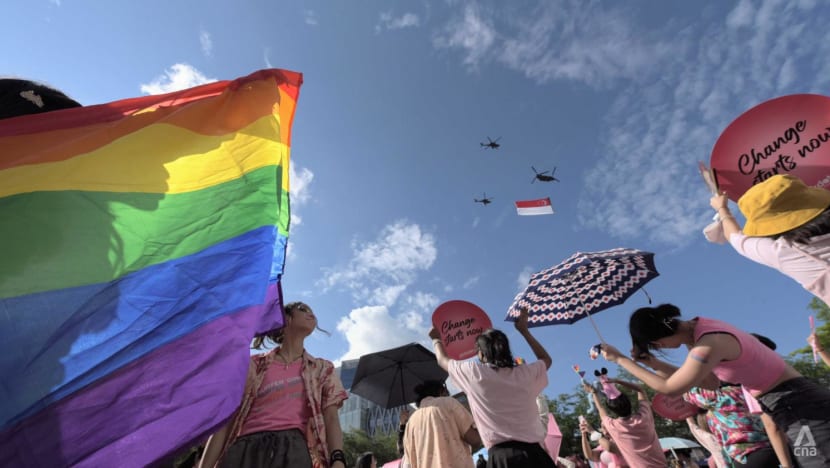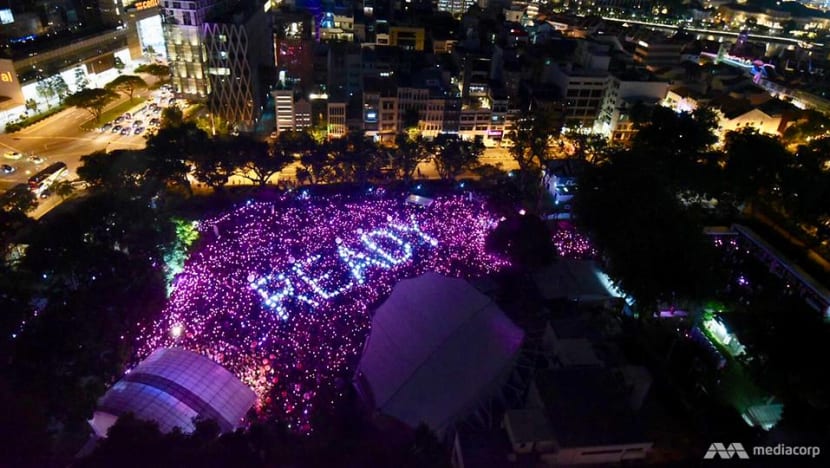Commentary: Any party forming the government of the day would not have lifted party whip on 377A but that’s not the point
Why did WP lift the party whip but not the PAP on the vote to repeal Section 377A? We’re focusing on the wrong thing in this debate, says Eugene K B Tan.

The Pink Dot crowd cheering as the state flag is flown as part of the National Day Parade rehearsal on Jun 18, 2022. (Photo: CNA/Try Sutrisno Foo)
SINGAPORE: Should the ruling People’s Action Party (PAP) have lifted the party whip when Parliament voted Tuesday evening (Nov 29) on the proposed repeal Section 377A of the Penal Code? All PAP MPs voted to decriminalise consensual sexual activity between two men, in line with the party’s position.
The Workers’ Party (WP) sought to characterise the debate as involving a matter of conscience and religious beliefs. As such, Leader of the Opposition Pritam Singh lifted his party whip to allow WP MPs to vote freely, while Minister for Home Affairs and Law K Shanmugam saw this as the WP not taking a stand on the issue.
Politics aside, too much has perhaps been made of PAP and WP’s contrasting approaches regarding their party whips.
Instead, the focus should centre on what MPs on both sides said — individually and collectively —whether for or against the repeal and the related Constitutional amendment to protect the definition of marriage.
RARE FOR ANY PARTY TO LIFT WHIP
Let’s be clear: Under the Westminster parliamentary system which Singapore inherited from the British, the government of the day will rarely lift the whip on any Government Bill and motion.
Indeed, it is rare for the PAP party whip to be lifted. In the same way, the WP does not lift the party whip on most matters and would likely do the same if it formed the government of the day.
The rationale is simple. The government must prevail in its legislative agenda. A defeat in a parliamentary vote would undermine public confidence in the Government to execute its policy agenda.
An opposition party has the luxury of lifting its party whip because the political stakes for it are much lower. It may make the party appear to be bold and open-minded, although its lack of a unified stand on key issues could also be politically damaging.
SITTING ON FENCE IS NOT AN OPTION
Government MPs may and often do voice their deep concerns and reservations about proposed changes in laws and yet vote in favour of them. There is nothing hypocritical about this - in fact, it is to be expected.
What is crucial to any system of parliamentary democracy is that the MPs are free to express themselves during the debate. If MPs could not speak without fear or favour, an invaluable opportunity would be lost to voice out the people’s concerns – only then can they be addressed.
The Government is obliged to respond to MPs’ views, even those not aligned with their party’s position, and to persuade them as well as Singaporeans that it is the right thing to do.
Sitting on the fence is not an option for the government of the day. The resolve to take a considered stand on a sensitive issue is what Singaporeans expect it to do.
This is especially so for 377A. The apex court had ruled in February that the law cannot be enforced in its entirety and which is also probably infringing the constitutional protection on equality before the law and the equal protection of the law.
Not everyone will be agreeable to or supportive of the landmark moves Parliament made on Tuesday, which is why failure to pass the Bills with convincing margins could have risked entrenching polarised views in society. The repeal of Section 377A passed with 93 to three votes, while the constitutional amendment passed with 85 to two votes.
A POST-377A SOCIETY
The views of parliamentarians eloquently and passionately expressed over the two days, ultimately, centred on how to move forward on an issue from which Singapore and Singaporeans must come out winners. The legal status quo ante cannot remain.

Taken together, both amendments seek to chart in an even-handed manner Singapore’s post-377A future. It is about putting a firm foundation for contending groups to co-exist and thrive despite their deepest differences.
Living in an inclusive Singapore is not only about living with people like us but also with people unlike us. But there must also be a set of shared values and a robust framework for dealing with differences.
MPs were mostly in agreement that discrimination against people unlike them has no place in our society. The concerns revolved around how to ensure that our post-377A future does not descend into discord, division and a culture war.
But despite Parliament convincingly passing the two Bills, they will neither end discrimination nor will they strengthen the institution of marriage and family. These require our collective efforts, not just laws.
Tuesday’s outcome in Parliament would probably not be different even if the whip had been lifted for PAP MPs. It reflects the shifting social attitudes of Singaporeans.
Eugene K B Tan is associate professor of law at the Singapore Management University.














_1.jpg?itok=Pt4lopXb)




